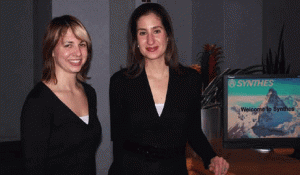 For Whiting School students and engineers from Synthes, collaboration is a no-brainer. What makes it so effortless, says Synthes business manager Maria Maroulis ’96, MS ’01, is that their cultures are so aligned.
For Whiting School students and engineers from Synthes, collaboration is a no-brainer. What makes it so effortless, says Synthes business manager Maria Maroulis ’96, MS ’01, is that their cultures are so aligned.
The global medical device company designs plates, screws, and other instruments and implants for every bone in the human body, and its engineers work in one of three divisions: trauma, spine, or craniomaxillofacial (CMF). Having forged a connection to the Whiting School through alumni such as Maroulis, a member of the Whiting School’s National Advisory Council, and Dennis Chien ’84, group manager of Synthes’ spine division, Synthes currently sponsors a senior design project in the mechanical engineering department, and last summer it recruited exclusively from the school’s biomedical engineering program for a product developer position.
The design project, currently under way, is overseen by four of the company’s senior mechanical engineers in the CMF division. Over the course of the academic year, students meet every other week with their mentors, usually via webcast, to develop a working prototype of an improved sternum stabilizer that the company may be able to commercialize. Charged with finding a better way to stabilize the sternum after open-heart surgery, the students get real-world experience in medical device design and Synthes is able to invest in young talent and benefit from the ideas and designs of the school’s “superbright students.”
In the trauma division, product developer and engineering associate Michelle Zwernemann ’08 has found her position to be a “fantastic opportunity.” Currently working with a product design team, Zwernemann is part of Synthes’ rotation program, which targets high-potential graduating engineering students and gives them four six-month rotational assignments. The company, headquartered in West Chester, Pennsylvania, will provide future rotations for Zwernemann in manufacturing and in the innovation group, as well as a possible term in its Switzerland office.
“Whiting School students are patient-driven and clinically focused, and they want to work with surgeons and doctors,” says Maroulis, who is a business unit manager within the CMF division. And Synthes’ conjoining of technology to medical applications appeals to students who want to work in health care and are drawn to bench-to-bedside projects. The marriage of bench science to the real world of medicine, she says, resonates very clearly at Hopkins, which draws engineering students who want to work with clinicians. “This is a self-selective process.” So far, the Whiting-Synthes symbiosis has worked out well for everyone. The mechanical engineering seniors are able to work on a project that advances their career goals, and the company can invest in talent for the future. “We make innovative products that are used in surgeries,” says Maroulis. “It’s a Hopkins engineer’s dream.”




